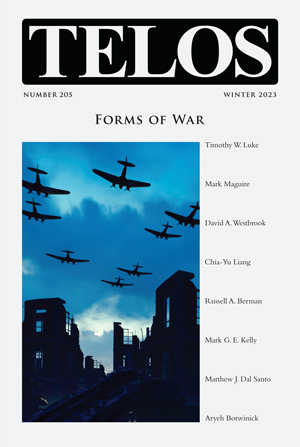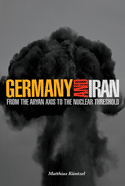 The video of the second webinar in the Telos-Paul Piccone Institute’s Israel initiative is now available and can be viewed here. Titled “Historians on Ideology and Politics in the 1948 War: October 7 and the Aftershocks of World War II,” the webinar featured historians Jeffrey Herf, Matthias Küntzel, and Benny Morris. Their conversation was moderated by Israel initiative director Gabriel Noah Brahm.
The video of the second webinar in the Telos-Paul Piccone Institute’s Israel initiative is now available and can be viewed here. Titled “Historians on Ideology and Politics in the 1948 War: October 7 and the Aftershocks of World War II,” the webinar featured historians Jeffrey Herf, Matthias Küntzel, and Benny Morris. Their conversation was moderated by Israel initiative director Gabriel Noah Brahm.
|
REMINDER:
Click here to register for the event. All subsequent panels are likewise scheduled for noon EST on the seventh day of each month throughout 2024. Panels will run between 90 to 120 minutes long, followed by colloquy among panelists and audience Q&A. Building on the success of our thought-provoking first panel, which laid the groundwork for ongoing discussion of critical theory and the Israel–Hamas conflict, our next panel features renowned historians, Jeffrey Herf, Matthias Küntzel, and Benny Morris. Herf’s presentation is titled “Israel’s Moment: The Forgotten International Politics Regarding the Establishment of the State of Israel.” Küntzel will present on “Nazi Antisemitism and the Hamas Massacre.” Morris will consider October 7 and the 1948 Arab–Israeli war as jihad. Series organizer Gabriel Noah Brahm will moderate.
Telos 205 (Winter 2023): Forms of War is now available for purchase in our store. Individual subscriptions to Telos are also available in both print and online formats.
Similarly, the war between Israel and Hamas began with Hamas’s use of terror and rape as instruments of war. The idea was to provoke Israel into attacking Hamas and causing civilian casualties. Because the terrain of war extends to public opinion in the West, Hamas’s use of Israeli hostages and Palestinian human shields becomes part of its strategy of increasing civilian casualties in the war. Even though Hamas is the ultimate cause of such casualties, Hamas is able to pressure Israel by placing civilians in the path of Israel’s war effort. The conflict on the ground in Gaza is thus overshadowed by the struggle for hearts and minds across the globe. In a new opinion piece in the Jerusalem Post, Sean Durns discusses Matthias Küntzel’s Germany and Iran: From the Aryan Axis to the Nuclear Threshold, published by Telos Press. Pick up your copy of Germany and Iran in our online store, and save 20% with the coupon code BOOKS20.
As an occasional feature on TELOSscope, we highlight a past Telos article whose critical insights continue to illuminate our thinking and challenge our assumptions. Today, Flaminia Incecchi looks at Giuseppe Parlato’s “Giovanni Gentile: From the Risorgimento to Fascism” from Telos 133 (Winter 2005). Giovanni Gentile is one of many important philosophers that have been eclipsed by shifting fashions in modern academia. In becoming overshadowed, he now often is forgotten and to some extent shunned. After all, most philosophy departments have become increasingly polarized as their orthodoxies crystallize in the analytic or the continental camp, leaving them, in most cases, without much hope for dialogue. It seems useful to ask: Who should look at Gentile? Which philosophy department should engage with his thought? On paper, it seems that Gentile does not have much to offer to one sect or the other. This misfit quality is worsened and to some degree excused by the various ideological shadows that precede Gentile. At that point, Gentile’s ideological predispositions provide an indisputable alibi for the silence surrounding his thought. Most of his works have not been translated from the Italian, which limits his prospective audiences significantly. Of course, Gentile also is not at the center of academic disputes today in Italy. |
||||
|
Telos Press Publishing · PO Box 811 · Candor, NY 13743 · Phone: 212-228-6479 Privacy Policy · Data Protection Copyright © 2025 Telos Press Publishing · All Rights Reserved |
||||




